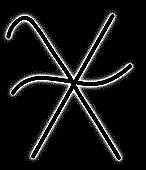
If you were poll the random "person on the street" about their knowledge of dinosaur names, or their favorite dinosaur, chances are that most folks would name the Tyrannosaurus Rex. But after the mighty T.Rex there would be quite a lot of folks who would name the Brontosaurus (thunder lizard). The massive swamp-dwelling herbivores have been one of the staple dinosaurs for appearance in schools and popular culture for years, starting from when it was first discovered and named in the late 1800s. The gentle giants that all the kids love. So popular the Post Office chose it as one of the four dinosaur stamps they released in the 70s.
The problem is... there's no such thing as a Brontosaurus. It's been removed from books and museums because, despite everything we've heard about the mighty Thunder Lizard, it actually never existed. In fact, the guy who discovered it mis-identified the fossil skeleton he found when a mostly complete skeleton was found with the wrong skull in 1879. In actuality, the skeleton he found was of a species he'd already discovered and named two years earlier - the much lamer-sounding (though perhaps appropriately named) Apatosaurus (deceptive lizard).
The goof was actually discovered and published in 1903. So why are we still calling it a Brontosaurus more than 100 years later? Well, the correction was first published in Geological Series of the Field Columbian Museum , which from the name you can probably determine is a pretty obscure journal, even if you're NOT familiar with geological study. The catchier name also was used as the mascot for the Sinclair Oil Company for many years, and was, as previously mentioned, even listed on a US Postage Stamp. So people know Brontosaurus.
In practice, most folks recognize Brontosaurus as a synonym of the scientifically correct Apatosaurus, and geologists generally have more important things to worry about than this little misnomer.
But that still doesn't change the fact that your teacher was wrong.
Again.
